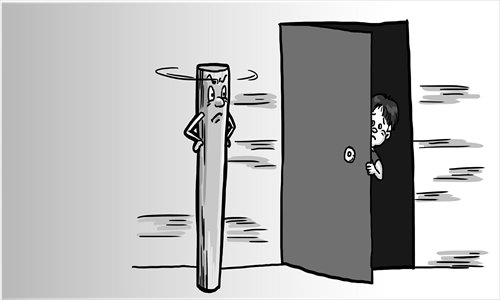Customary spanking doesn't cross boundary into abuse

The horrifying case of Lele from Changle county, Shandong Province, a six-year-old girl whose teacher encouraged the other children to take turns hitting her, has shocked Chinese netizens. But the corporal punishment of children continues to be legally and socially sanctioned in China. Does spanking serve to cover up worse abuse? Should the law step in? Two commentators contributed their thoughts.
Chinese children are familiar with the dread expression "chicken feather duster." It's one of the most common tools wielded by parents to punish kids. In my childhood memories, my mother's words, "where's my chicken feather duster," was enough of a deterrent to make me shiver and change my behavior.
Kids in my neighborhood largely have similar experiences. Long rulers, wet towels and broom sticks were all trump cards for parents. I still remember the cries and howls of a teenage boy who lived next door after he was caught by his dad in a gaming arcade and brought home. The next day his mom embarrassed him in front of the neighbors: "Think about your father's leather belt before you step into the arcade next time!"
It seems a miracle that none of us become cowardly or psychologically damaged after we grow up. In fact, in retrospect, childhood punishment often becomes an amusing interlude that parents like to bring up after you establish your own career. Corporal punishment is more like a cultural issue, as the Chinese believe "sticks help foster filial sons."
My mother used to type people into three types. The top type includes those who can grow up into productive adults without the need for corporal punishment. The second type is those who become useful after being prompted by punishment. And the third are hopeless cases, and will fail no matter whether their parents and teachers punish them or not.
I still remember after I got several A grades from my elementary school, my mother happily placed me into the second type.
In Chinese culture, teachers are highly respected, and enjoy the same status as parents. Some parents prefer strict discipline by teachers. This is why we often hear such an odd request during parents' meetings at school: "Teacher, do not hesitate to hit my kid if he's too naughty!"
The cultural tradition of corporal punishment in China doesn't mean there is no bottom line or that violence can be used at will.
In fact, there is always a tacit ethical limit within which corporal punishment can be used. Not to mention that today in this one-child society, kids are unprecedentedly cherished. The degree of corporal punishment has already decreased between my parents' generation and my own, as today's new fathers and mothers are going somewhat softer on children.
Although corporal punishment is still used, it is widely accepted that extreme violence should definitely be ruled out.
Only psychotic teachers could think of mobilizing all the kids in a pre-school class in a kindergarten to punch a specific child, or using an electric iron to burn the face of mischievous kids, as in two cases that stirred up public fury.
In order to prevent such extreme cases, there can be more ways to prevent abuse. For instance, hot lines for reporting should be set up, and teachers or parents with violence addiction should be punished.
However, it would be far too difficult a task to ban such violence through legislation, since "a proper degree of corporal punishment" is accepted by society.
And this tradition will continue to coexist with spoiling "little emperors" in one-child families.
The author is an opinion editor with the Global Times. chenchenchen@globaltimes.com.cn
Striking children brutalizes both kids and adults in end